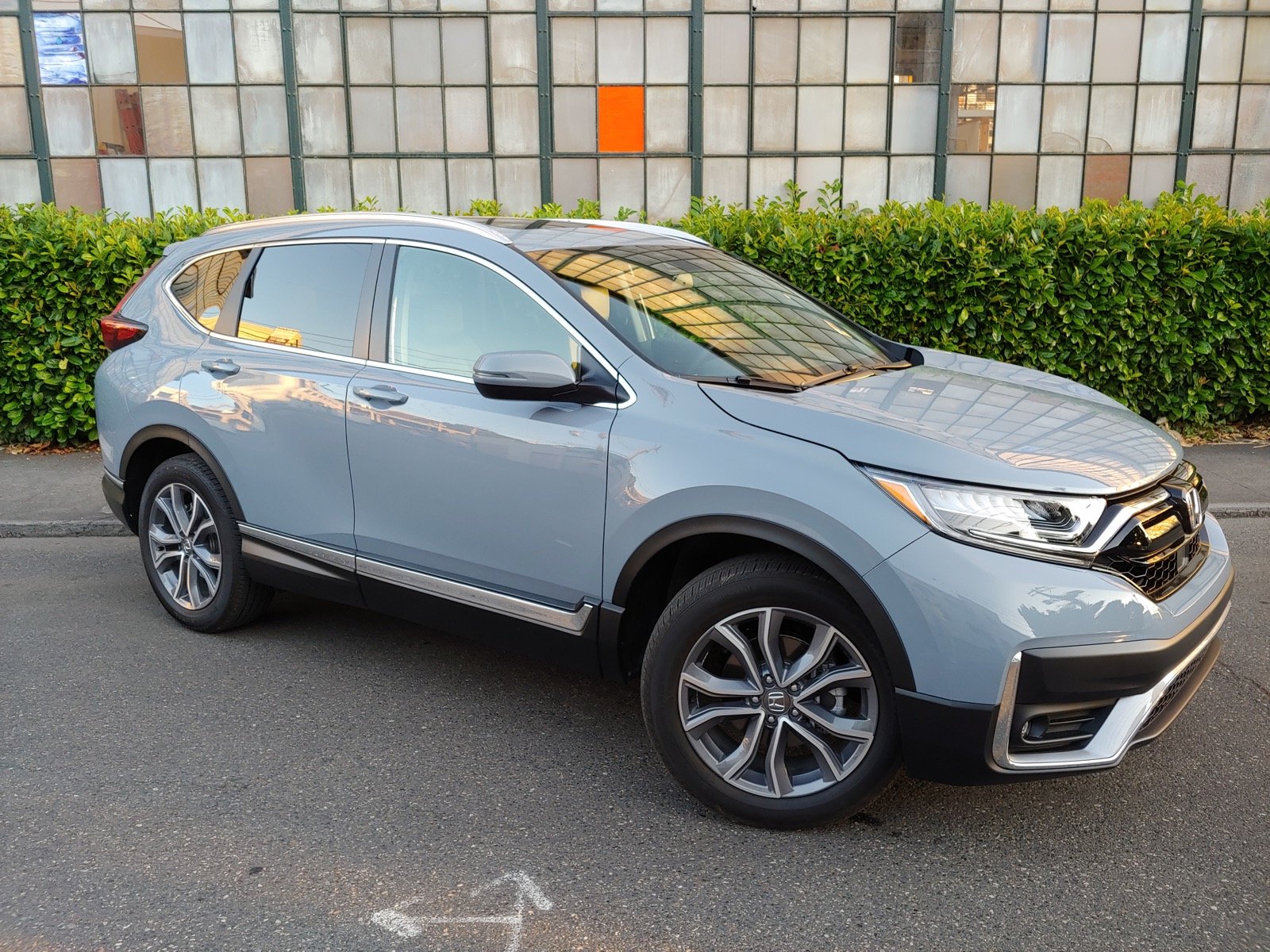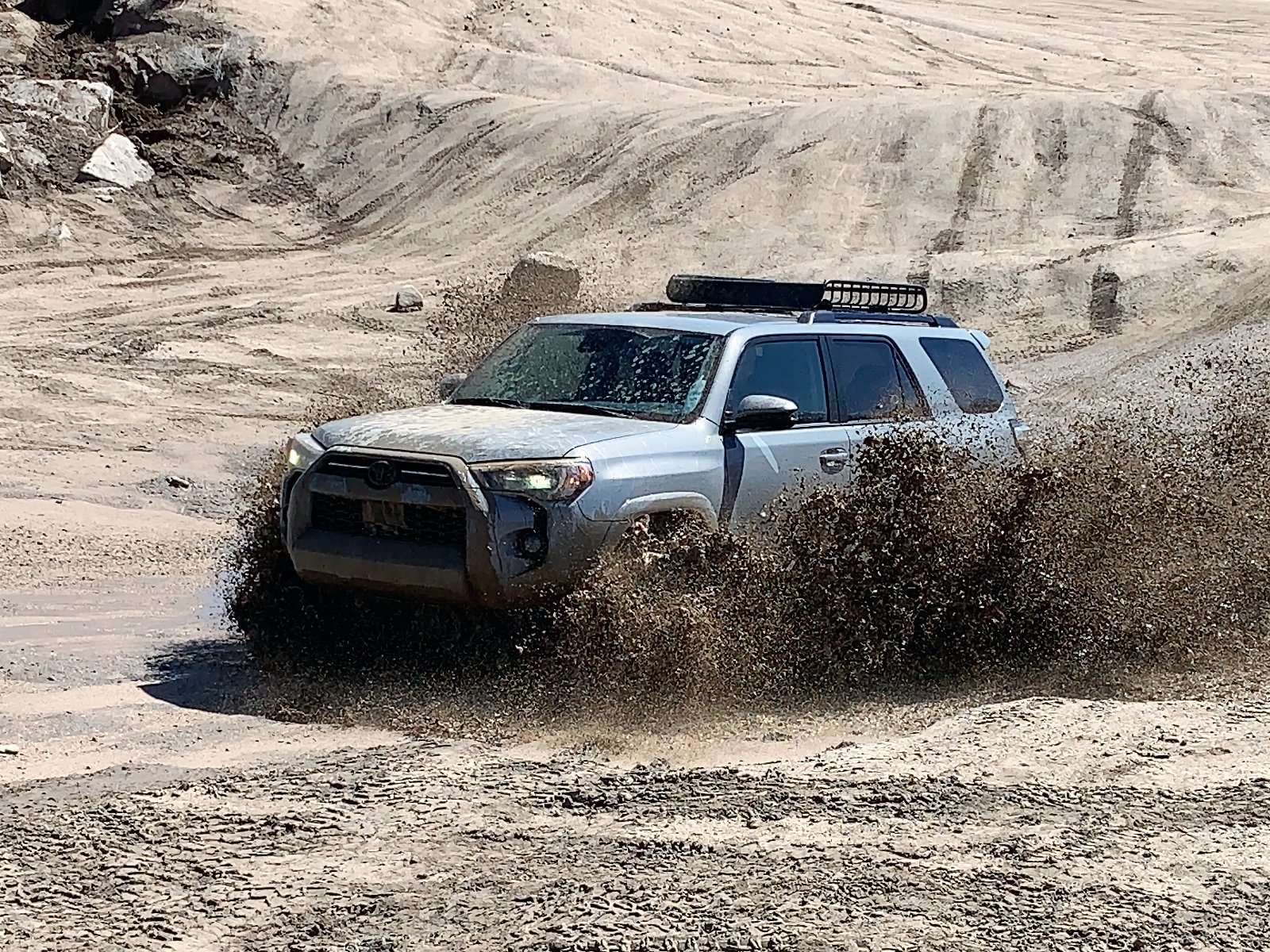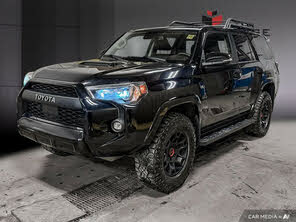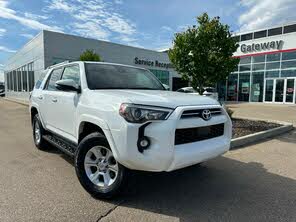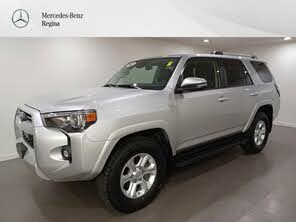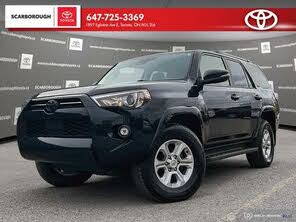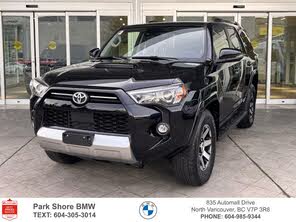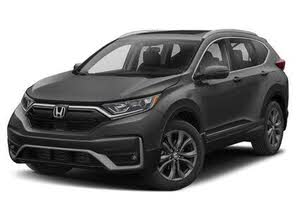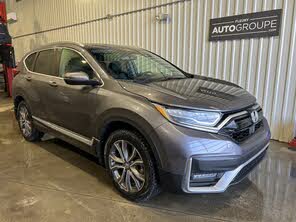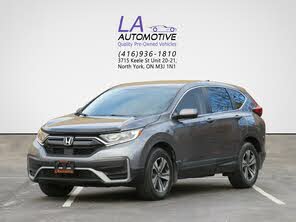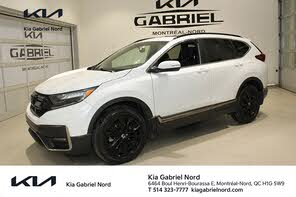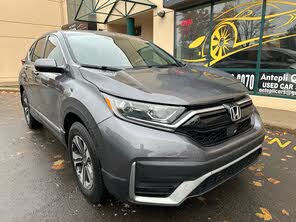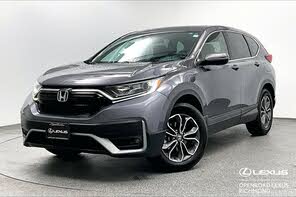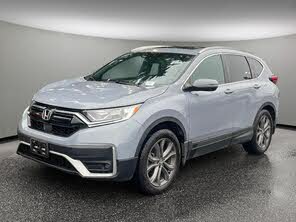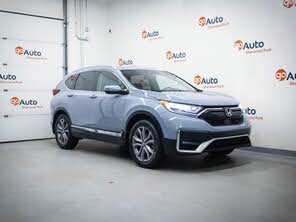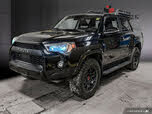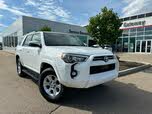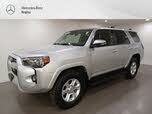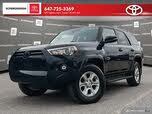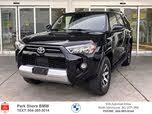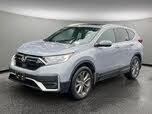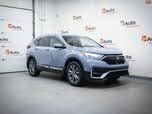2021 Toyota 4Runner vs 2020 Honda CR-V
Overview | |
MSRP$25,150 | MSRP$36,765 |
Average price$28,903 | Average price$51,408 |
Listings411 | Listings35 |
Ratings & Reviews | |
User Reviews | User Reviews |
Expert reviews7.5 out of 10 | Expert reviews6.2 out of 10 |
Pros
| |
2020 Honda CR-V Reviews SummaryHonda’s compact SUV has been satisfying buyers for more than two decades, with more than five million CR-V’s sold. Such a legacy means the CR-V has long had its wrinkles smoothed out into a comfortable and capable crossover package that’s only downside may be its sheer inoffensiveness. The 2020 model year saw engine and safety upgrades, which improve fuel efficiency and help to make Honda’s bestseller an even better value. | |
2021 Toyota 4Runner Reviews SummaryDespite its design age, poor fuel efficiency, rough ride, iffy handling, and marginal safety ratings, the current-generation Toyota 4Runner remains a popular choice in a midsize SUV. Why? Its reputation for reliability and resale value, coupled with its undeniable utility, rugged image, and go-anywhere and do-anything capability, are the selling points. And if that's why you want a 2021 Toyota 4Runner, it won't disappoint you as long as you accept its shortcomings. | |
No video found | No video found |
Popular Features & Specs | |
Engine1.5L 190 hp I4 | Engine4.0L 270 hp V6 |
Drive TrainFWD | Drive Train4X2 |
Seating Capacity5 | Seating Capacity7 |
Horsepower190 hp @ 5600 rpm | Horsepower270 hp @ 5600 rpm |
MPG City28 | MPG City16 |
MPG Highway34 | MPG Highway19 |
Engine | |
Engine Name1.5L 190 hp I4 | Engine Name4.0L 270 hp V6 |
Torque179 lb-ft @ 2000 rpm | Torque278 lb-ft @ 4400 rpm |
Horsepower190 hp @ 5600 rpm | Horsepower270 hp @ 5600 rpm |
DrivetrainFWD | Drivetrain4X2 |
Fuel Economy | |
MPG City28 | MPG City16 |
MPG Highway34 | MPG Highway19 |
Interior | |
Seating Capacity5 | Seating Capacity7 |
Safety | |
Front Crash Overall5 | Front Crash Overall4 |
Side Crash Overall5 | Side Crash Overall5 |
Dimensions & Capacity | |
Cargo Space39.2 cu ft | Cargo Space47.2 cu ft |
Curb Weight3337 lbs | Curb Weight4400 lbs |
Height66.1 in | Height71.5 in |
Length182.1 in | Length190.2 in |
Width73.0 in | Width75.8 in |
Wheelbase104.8 in | Wheelbase109.8 in |
Maximum Payload1358 lbs | Maximum Payload1700 lbs |
Number of doors4 | Number of doors4 |
Maximum Towing Capacity1500 lbs | Maximum Towing Capacity5000 lbs |
Standard Towing Capacity | Standard Towing Capacity5000 lbs |
Overview | ||
MSRP | $25,150 | $36,765 |
Average price | $28,903 | $51,408 |
Listings | ||
Ratings & Reviews | ||
User reviews | ||
Expert reviews | 7.5 out of 10Read full review | 6.2 out of 10Read full review |
Pros & cons | Pros
| |
Summary | Honda’s compact SUV has been satisfying buyers for more than two decades, with more than five million CR-V’s sold. Such a legacy means the CR-V has long had its wrinkles smoothed out into a comfortable and capable crossover package that’s only downside may be its sheer inoffensiveness. The 2020 model year saw engine and safety upgrades, which improve fuel efficiency and help to make Honda’s bestseller an even better value. | Despite its design age, poor fuel efficiency, rough ride, iffy handling, and marginal safety ratings, the current-generation Toyota 4Runner remains a popular choice in a midsize SUV. Why? Its reputation for reliability and resale value, coupled with its undeniable utility, rugged image, and go-anywhere and do-anything capability, are the selling points. And if that's why you want a 2021 Toyota 4Runner, it won't disappoint you as long as you accept its shortcomings. |
Video | No video found | No video found |
Popular Features & Specs | ||
Engine | 1.5L 190 hp I4 | 4.0L 270 hp V6 |
Drive Train | FWD | 4X2 |
Seating Capacity | 5 | 7 |
Horsepower | 190 hp @ 5600 rpm | 270 hp @ 5600 rpm |
MPG City | 28 | 16 |
MPG Highway | 34 | 19 |
Engine | ||
Engine Name | 1.5L 190 hp I4 | 4.0L 270 hp V6 |
Torque | 179 lb-ft @ 2000 rpm | 278 lb-ft @ 4400 rpm |
Horsepower | 190 hp @ 5600 rpm | 270 hp @ 5600 rpm |
Drivetrain | FWD | 4X2 |
Fuel Economy | ||
MPG City | 28 | 16 |
MPG Highway | 34 | 19 |
Interior | ||
Seating Capacity | 5 | 7 |
Safety | ||
Front Crash Overall | 5 | 4 |
Side Crash Overall | 5 | 5 |
Dimensions & Capacity | ||
Cargo Space | 39.2 cu ft | 47.2 cu ft |
Curb Weight | 3337 lbs | 4400 lbs |
Height | 66.1 in | 71.5 in |
Length | 182.1 in | 190.2 in |
Width | 73.0 in | 75.8 in |
Wheelbase | 104.8 in | 109.8 in |
Maximum Payload | 1358 lbs | 1700 lbs |
Number of doors | 4 | 4 |
Maximum Towing Capacity | 1500 lbs | 5000 lbs |
Standard Towing Capacity | 5000 lbs | |

By: CarGurus + AI
At CarGurus, our team of experienced automotive writers remain at the heart of our content operation, conducting hands-on car tests and writing insightful guides that are backed by years of industry experience. To complement this, we are harnessing AI to make our content offering more diverse and more helpful to shoppers than ever. To achieve this, our AI systems are based exclusively on CarGurus content, ratings and data, so that what we produce is both unique to CarGurus, and uniquely helpful to car shoppers.
Popular vehicle comparisons
2019 Volvo XC40 vs 2020 Honda CR-V2019 Buick Enclave vs 2020 Honda CR-V2020 MINI Countryman vs 2021 Toyota 4Runner2019 Chrysler Pacifica Hybrid vs 2020 Honda CR-V2020 Lexus RX Hybrid vs 2021 Toyota 4Runner2019 Volkswagen Tiguan vs 2020 Honda CR-V2019 Honda Odyssey vs 2020 Honda CR-V2019 Lexus GX vs 2020 Honda CR-V2020 Acura MDX vs 2021 Toyota 4Runner2020 Lexus NX vs 2021 Toyota 4Runner2020 Lincoln Aviator vs 2021 Toyota 4Runner2019 Buick Encore vs 2020 Honda CR-V2020 Chrysler Pacifica Hybrid vs 2021 Toyota 4Runner2020 Nissan Rogue vs 2021 Toyota 4Runner2019 Toyota Sienna vs 2020 Honda CR-V2019 Honda Passport vs 2020 Honda CR-V2019 Mitsubishi Outlander Sport vs 2020 Honda CR-V2019 Chrysler Pacifica vs 2020 Honda CR-V2019 MINI Countryman vs 2020 Honda CR-V2019 Dodge Grand Caravan vs 2020 Honda CR-V2020 Volvo XC90 vs 2021 Toyota 4Runner2019 Lincoln Navigator vs 2020 Honda CR-V2020 Buick Encore vs 2021 Toyota 4Runner2020 Dodge Grand Caravan vs 2021 Toyota 4Runner
2022 Toyota 4Runner vs 2022 Nissan Rogue2022 Toyota 4Runner vs 2022 Toyota Sienna2022 Honda Odyssey vs 2023 Toyota 4Runner2022 Toyota Sienna vs 2023 Toyota 4Runner2022 Volvo XC90 vs 2023 Toyota 4Runner2022 Toyota 4Runner vs 2022 Lincoln Navigator2022 Volkswagen Tiguan vs 2022 Toyota 4Runner2022 Lincoln Aviator vs 2022 Toyota 4Runner2022 Volvo XC90 vs 2022 Toyota 4Runner2022 Chrysler Pacifica vs 2023 Toyota 4Runner2022 Lexus GX vs 2022 Toyota 4Runner2022 Volvo XC40 vs 2023 Toyota 4Runner2022 Chrysler Pacifica Hybrid vs 2022 Toyota 4Runner2022 MINI Countryman vs 2023 Toyota 4Runner2022 Volkswagen Tiguan vs 2023 Toyota 4Runner2022 Lincoln Aviator vs 2023 Toyota 4Runner2022 Buick Enclave vs 2023 Toyota 4Runner2022 Honda Odyssey vs 2022 Toyota 4Runner2021 Volkswagen Tiguan vs 2021 Honda CR-V2021 Honda Odyssey vs 2022 Honda CR-V2021 Buick Enclave vs 2022 Toyota 4Runner2021 Toyota Sienna vs 2022 Honda CR-V2021 Volvo XC90 vs 2021 Honda CR-V2021 Volvo XC90 vs 2022 Honda CR-V2021 Lexus NX vs 2022 Honda CR-V2021 Buick Enclave vs 2022 Honda CR-V2021 Chrysler Pacifica Hybrid vs 2021 Honda CR-V2021 Lexus NX vs 2022 Toyota 4Runner2021 Volkswagen Tiguan vs 2022 Toyota 4Runner2021 Honda CR-V vs 2021 Mitsubishi Outlander Sport2021 MINI Countryman vs 2021 Honda CR-V2021 Buick Encore vs 2021 Honda CR-V2021 Buick Encore vs 2022 Toyota 4Runner2021 MINI Countryman vs 2022 Honda CR-V2021 Buick Enclave vs 2021 Honda CR-V2021 Honda Odyssey vs 2022 Toyota 4Runner2020 Toyota 4Runner vs 2021 MINI Countryman2020 Honda Odyssey vs 2021 Honda CR-V2020 Honda CR-V vs 2021 Honda CR-V2020 Toyota 4Runner vs 2021 Nissan Rogue2020 Toyota 4Runner vs 2021 Chrysler Pacifica Hybrid2020 Toyota 4Runner vs 2021 Volvo XC402020 Chrysler Pacifica vs 2021 Honda CR-V2020 Toyota Sienna vs 2021 Honda CR-V2020 Volvo XC40 vs 2021 Honda CR-V2020 Toyota 4Runner vs 2021 Lincoln Navigator2020 Toyota 4Runner vs 2021 Volvo XC902020 Toyota 4Runner vs 2021 Mitsubishi Outlander Sport2020 Toyota 4Runner vs 2021 Buick Encore2020 Buick Encore vs 2021 Honda CR-V2020 Lexus NX vs 2021 Honda CR-V2020 MINI Countryman vs 2021 Honda CR-V2020 Toyota 4Runner vs 2021 Honda Odyssey2020 Lexus RX Hybrid vs 2021 Honda CR-V2019 Lincoln Navigator vs 2020 Toyota 4Runner2019 Honda CR-V vs 2020 Chrysler Pacifica2019 Honda CR-V vs 2020 Toyota Sienna2019 Toyota 4Runner vs 2019 Toyota Sienna2019 Buick Encore vs 2020 Toyota 4Runner2019 Toyota 4Runner vs 2019 Dodge Grand Caravan2019 Honda Odyssey vs 2020 Toyota 4Runner2019 Lexus GX vs 2020 Toyota 4Runner2019 Toyota 4Runner vs 2019 Buick Encore2019 Toyota Sienna vs 2020 Toyota 4Runner2019 Honda CR-V vs 2020 Acura MDX2019 Honda CR-V vs 2020 Volvo XC402019 Dodge Grand Caravan vs 2020 Toyota 4Runner2019 Volvo XC40 vs 2019 Toyota 4Runner2019 Honda CR-V vs 2020 Dodge Grand Caravan2019 Honda CR-V vs 2020 Mitsubishi Outlander Sport2019 Honda CR-V vs 2020 Lexus RX Hybrid2019 Honda CR-V vs 2020 Lexus GX
